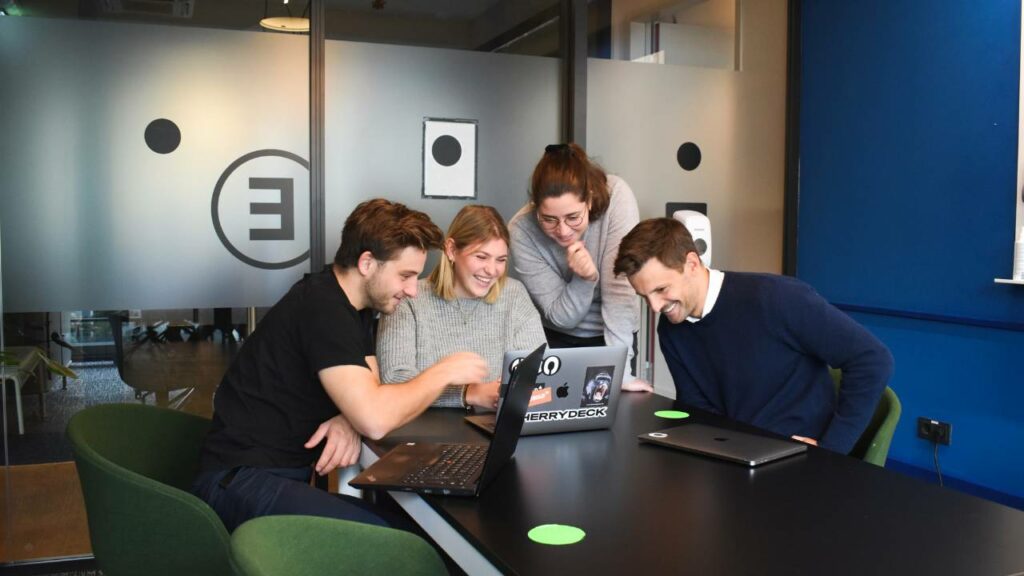The future of work in Ireland is evolving rapidly as organisations increasingly prioritise employee life choices and well-being. This transformation is evident in various industries, with an emphasis on providing employees with a healthy work-life balance and accommodating their preferences. Companies are recognising the need to put people first, understanding that contented employees will be more productive, engaged, and committed to the success of their organisations.
One key aspect of this change is the acceleration of remote work policies, prompted by recent global events such as the pandemic. Many Irish businesses have successfully adapted to this new way of working, leading to increased flexibility for staff and improved communication across teams. Another critical factor in this evolution is a growing focus on skills development and productivity. Employers are more aware of the need to invest in their employees, nurturing their growth and ensuring they reach their full potential.
Embracing these shifts in Ireland’s future of work landscape is essential for companies to stay competitive and maintain their talent pool. By prioritising employee life choices, organisations can foster a positive, inclusive, and innovative workplace culture. This approach will ultimately result in a more resilient, future-ready workforce equipped to thrive in the constantly changing world of work.
The Evolving Work Landscape and Employee Life Choices
As the world of work undergoes significant changes, Ireland’s workforce is witnessing a shift in priorities and values. In the emerging landscape, employees are increasingly focused on achieving a better work-life balance, leveraging remote working opportunities, and seeking meaningful jobs that align with their values. Employers in Ireland need to adapt and develop workforce strategies that address these priorities and support employees in this new era of work.
One driving factor behind the evolving work landscape is the rise of remote working. COVID-19 accelerated this trend, prompting many organisations to adopt flexible working arrangements during the pandemic. As employees experienced the benefits of working from home, such as saving time on commutes and having a more flexible schedule, their priorities began to shift. Many workers now express a strong preference for jobs that offer some degree of remote working, even after the pandemic subsides.
In addition to remote working, the gig economy plays a significant role in shaping the future of work. As more people opt for freelance jobs or independent contracts over traditional employment, it is apparent that the nature of work is becoming more diverse. Employees can choose from various career paths, allowing them to tailor their jobs to their interests and lifestyle preferences. This trend towards flexible job options provides workers with greater control over their professional and personal lives.
On the subject of personal life choices, businesses are beginning to understand the significance of supporting diverse decisions, such as those related to responsible family planning. For example, offering the necessary support for men who undergo vasectomy in Ireland – a profound personal choice – and ensuring they can take adequate time off for recovery represents the epitome of a caring employer. Recognising the importance of such decisions can contribute to building trust and showcasing empathy towards employees’ needs.
Another critical aspect of the evolving work landscape is the importance of work-life balance. Employees are voicing their need for jobs that allow them to maintain their well-being and nurture personal relationships alongside professional growth. Companies that successfully address these demands by fostering a supportive working environment will stand out when it comes to attracting and retaining top talent in Ireland for the coming years.
In response to these changes, employers need to implement innovative workforce strategies. For instance, introducing flexible working policies that promote remote working or providing training for in-demand skills in the gig economy can help employees adapt to new ways of working. It is vital for businesses to acknowledge the shift in employee priorities and create an environment where workers feel supported, engaged, and valued.
As the future of work unfolds in Ireland, both employers and employees must embrace the changing landscape and build a sustainable, fulfilling work environment. Prioritising employee life choices and fostering a culture of flexibility, inclusivity, and well-being will be crucial for long-term success in this evolving world of work.
Technological Disruption: Automation, AI and the Workforce

The advent of artificial intelligence (AI), automation, and robotics has brought about a significant shift in the landscape of work in Ireland, as well as across the globe. With these advanced technologies, productivity rates have the potential to increase manifold, thereby benefiting organisations and employees alike. However, this transition comes with its share of uncertainty and challenges, given the disruption that the workforce might encounter due to the introduction of such technologies.
AI has permeated numerous industries, causing an increase in productivity and contributing to reversing the decline witnessed in previous years. According to McKinsey, AI and automation could potentially lead to an annual productivity growth rate of 2 percent over the next decade, with 60 percent of this increase attributed to the adoption of digital opportunities. This technological change is driven by factors such as the need for efficiency, cost-cutting measures, and improved customer service.
In tandem with these advancements, next-gen business surveillance emerges as a key player, allowing companies to maintain a secure environment. As businesses adopt more advanced technological platforms, ensuring the safety and security of both assets and employees becomes paramount. By integrating sophisticated surveillance systems, organisations can monitor operations, deter potential threats, and instil a sense of safety among the workforce.
However, amid the productivity benefits, workforce disruption remains a significant concern. AI, automation, and robotics are likely to result in significant shifts in job roles and employment structures. Consequently, employees need to develop new skills to adapt to these changes successfully. McKinsey’s research estimates that the time spent utilising advanced technological skills will witness an increase of 50 percent in the United States and 41 percent in Europe by 2030. Advanced IT and programming skills, in particular, are expected to grow by as much as 90 percent between 2016 and 2030.
As businesses in Ireland adapt to the evolving nature of work, prioritising employees’ life choices becomes a gripping challenge. With the incorporation of AI and automation technologies, organisations need to invest in their workforce by upskilling employees, assisting them in acquiring new capabilities and enabling them to flourish in the age of technology. According to an OECD report, workers with strong digital skills are more capable of adapting to AI, potentially reaping the benefits that these technologies offer.
Despite the progress and potential benefits, there are lingering concerns regarding automation and AI’s impact on workers’ well-being. Various studies have highlighted the mixed consequences automation has on employee stress, job satisfaction, and overall health. As a result, businesses must carefully assess the potentially disruptive impacts of technology while ensuring that employee welfare remains at the forefront of their priorities.
Remote Working: A Data-Driven Analysis
The future of work is undergoing a significant shift, with remote working becoming more prevalent, particularly in Ireland. Increased adoption of remote work has been accelerated by the COVID-19 pandemic, prompting many organisations to adopt a hybrid virtual model that combines remote work with time in the office.
Utilising data and predictive analytics provides valuable insights for understanding this new work landscape and prioritising employee life choices. It is essential for organisations to be aware of the potential impact on wellbeing and work-life balance. Research has shown that while productivity may have increased during the pandemic, some employees have reported feeling anxious and burned out.
One aspect of remote working worth investigating is its relation to employee well-being and work-life balance. A study has shown that remote working can influence these factors in times of crisis. However, it is essential to consider that different industries, roles, and locations may respond differently to remote work.
Employing data-driven approaches can be beneficial in identifying ways to retain top employees while adapting to remote working. Companies are now able to utilise digital collaboration platforms and new data harvesting methods to predict individual preferences and requirements. This information can help inform organisational policies and support systems for remote employees, ultimately promoting personal and professional satisfaction.
Workplace Skills of the Future
As the future of work continues to evolve, the skills required in the workplace are also expected to change. It is vital for employers and employees in Ireland to understand and prioritise the development of these skills to ensure a competitive and successful workforce. This section will discuss several vital skills, such as upskilling, leadership, and adaptation to new technologies.
Two crucial skills that the World Economic Forum has recognised are critical thinking and problem-solving. These higher-level abilities are paramount in a world where change is constant, and unexpected challenges arise frequently. By mastering critical thinking and problem-solving, companies in Ireland can successfully navigate through diverse and complex situations.
The need to upskill is becoming increasingly important as technology progresses at a rapid pace and automation continues to impact the workforce. By investing in personal and professional growth, employees can ensure they remain relevant and valuable in the future labour market. This continuous learning approach ensures career opportunities and security.
Leadership is another essential skill for the future workplace. Strong leadership propels companies forward, guiding teams through difficult decisions and creating an inclusive, innovative work environment. Effective leaders inspire and motivate their teams, cultivating a culture of trust, agility, and adaptability.
Flexibility and adaptability are equally important in the ever-evolving work landscape in Ireland. With the emergence of new technologies, globalisation, and shifts in work patterns, those who demonstrate the capacity to quickly adjust to new circumstances and embrace change will have a competitive edge in the job market.
Government Strategies and Work Policies

Ireland’s government recognises the importance of balancing work and personal life choices as part of the future of work. To achieve this, they have implemented a range of strategies and policies focused on supporting employees and the workforce in general.
The Irish government introduced the Pathways to Work initiative, designed to reduce long-term unemployment by supporting 75,000 individuals in securing employment by July 2023. This initiative aims to decrease the youth unemployment rate back to the 2019 average of 12.5% by 2023, offering increased opportunities for young workers.
Another strategic focus is the development of the National Skills Strategy 2025, a comprehensive plan to support and enhance skills development for all individuals in Ireland. This strategy is intended to benefit employees, employers, and the overall economy by ensuring that the workforce remains competitive in a rapidly changing global market.
The government is also taking steps to address the growing trend of hybrid working; this includes providing guidance for employers on the key considerations for implementing a hybrid working policy. Such policies include identifying which employees are eligible for hybrid working and ensuring that the policy aligns with broader organisational goals.
Furthermore, the recently announced Work-Life Balance and Miscellaneous Provisions Bill outlines a series of legislative changes aimed at improving work-life balance for parents and carers, promoting equal sharing of parental leave between men and women, and focusing on increasing the representation of women in the labour market.
Economic Perspectives: GDP, Jobs and the Gig Economy
Ireland’s economy has experienced significant growth over the years, and its GDP continues to increase. As a result, the country has become an attractive destination for both domestic and international businesses. This economic prosperity has led to the creation of new job opportunities across various sectors.
One key development that’s shaping the future of work in Ireland is the rise of the gig economy. According to a PwC report, gig economy workers are currently classified in Ireland and other EU member states. The gig economy involves short-term, flexible work arrangements facilitated by digital platforms, which include opportunities for freelancers, independent contractors, and temporary employees.
From an economic perspective, the gig economy has two-fold benefits. Firstly, it provides companies with the flexibility to scale their workforce based on demand, allowing them to better adapt to the market’s changing needs. Secondly, gig economy workers can benefit from the freedom and flexibility to choose assignments that complement their skill sets and life choices.
However, the gig economy also brings certain challenges. For instance, the tax treatment and legal protections for these workers remain uncertain. Additionally, as these job opportunities tend to be short-term and lack benefits compared to traditional employment contracts, they may not be suitable for workers seeking long-term financial security.
As the Irish economy continues to evolve, it is essential to strike a balance between economic growth and the well-being of workers. This involves recognising the importance of the gig economy in providing flexible work options while also ensuring that measures are in place to protect gig economy workers from potential exploitation.
Emerging Business Models in the Age of Innovation
In the rapidly changing landscape of work and business, Ireland’s organisations must quickly adapt and embrace innovative approaches to secure a competitive position in the market. Emerging business models are one key factor to consider as companies in Ireland make critical decisions to prioritise employee life choices.
One aspect of technological advancements that has significantly impacted business models is the blurring of boundaries between physical and virtual worlds. This phenomenon has spurred the creation of hybrid models of work, with organisations adopting a mix of on-site and remote working arrangements. By enabling employees to choose when and where they work, companies can provide a more flexible environment that better accommodates the diverse needs and preferences of their workforce.
Another trend driven by innovation is the growing focus on data-driven decision-making. In an era marked by constant change, organisations must be nimble and responsive to shifting market demands, and harnessing real-time data has become essential in achieving this. Integrating advanced analytics and artificial intelligence into core business processes empowers firms to identify novel opportunities, improve operational efficiency, and drive customer engagement.
Moreover, businesses now increasingly rely on collaborative platforms and ecosystems to expand their reach and access to resources. By engaging in partnerships and forging alliances, companies can benefit from shared knowledge, reduced costs, and increased agility in the face of disruption. This interconnected approach empowers businesses to address complex challenges, deliver innovative solutions, and better cater to the evolving expectations of both employees and customers.
Equality in the Workforce: Gender and Age Considerations

Workplace equality is crucial for creating a fair and inclusive environment, which promotes employee well-being, diversity, and innovation. Within Ireland, there have been significant strides made on both the gender and age front to ensure equal opportunities for all workers.
Ireland has shown progress in addressing gender disparities in the workplace. In 2015, the country ranked eighth highest among EU member states on the Gender Equality Index, indicating progress towards achieving an equitable balance between men and women in the workforce. Despite this progress, the pay gap between men and women persists, with the median gender pay gap the two genders found to be 15.5% in the UK in 2020, which mirrors trends within the OECD. Reducing this wage gap remains a priority for ensuring gender equality.
Companies in Ireland have started to acknowledge the importance of fostering a diverse and inclusive work environment and have adopted several measures to address gender bias. One such measure is implementing standardised interviews and skills-based assessments, which help to address recruitment imbalances, particularly in male-dominated industries. By incorporating these strategies, businesses can address gender biases associated with their recruitment processes, thereby mitigating productivity losses caused by gender inequity.
In addition, age equality is another consideration necessary for achieving workplace equality. As the retirement age in Ireland is set to increase gradually, reaching 68 by 2028, it is essential to address age discrimination and support a multi-generational workforce. This includes offering flexible work arrangements, providing opportunities for learning and development, and establishing family-friendly policies. Flexible work arrangements and family-friendly policies can also contribute to gender equality by supporting work-life balance and enabling both men and women to participate equally in the labour market.
Hiring, Engagement and Autonomy
The future of work increasingly prioritises employee life choices, and organisations in Ireland are adapting their practices to attract and engage top talent. Hiring strategies now need to align with the evolving needs of potential employees, focusing not only on job competencies but also on ensuring work-life balance.
To attract more employees, employers should offer more autonomy. As the traditional office structure shifts to remote and hybrid arrangements, giving workers control over their schedules and tasks contributes to their overall satisfaction. Organisations that acknowledge the value of self-governance are more likely to draw candidates that resonate with autonomy-driven cultures.
Maintaining employee engagement in remote settings is essential to nurture a healthy work environment. Clear communication and regular check-ins create an atmosphere of inclusion. Additionally, management must show empathy and understanding in supporting employees as they manage personal and professional responsibilities, particularly while working from home.
Moreover, according to a Harvard Business Review report, an increasing number of workers prioritise lifestyle choices over work proximity, and they search for jobs in locations that foster a higher quality of life. Organisations must recognise this shift in values and provide opportunities for employees to work from locations far removed from traditional office spaces.
Work-Life Balance and Mental Health Considerations

Work-life balance is essential for maintaining good mental and physical health, and it plays a pivotal role in the long-term economic success of companies and their employees alike. As remote working becomes more common, especially in the context of the COVID-19 pandemic, companies in Ireland are seeing the benefits of prioritising work-life balance for their workers.
A key aspect of achieving work-life balance is creating a company culture that supports the mental health of employees. This includes open communication channels that allow staff members to openly discuss their stress levels, workload, and other concerns without fear of reprisal. By enabling employees to speak up and collaborate on implementing necessary adjustments, companies can alleviate undue stress and promote a healthy work environment.
Maintaining mental health within a company not only relies on improved communication but also on the provision of resources to mitigate stress. Employee Assistance Programmes (EAPs) and mental health support benefits have become an important part of modern workplaces in Ireland. These offerings can range from access to counselling services, stress management workshops, and other forms of professional assistance to ensure that employees have access to support when they need it most.
Fostering work-life balance and mental health also involves revisiting workplace policies and practices. This may include reassessing workload expectations, promoting flexible working hours, and encouraging employees to disconnect from work during their personal time. Taking deliberate steps to avoid burnout and promoting a balance between work and personal life will positively impact employee morale, productivity, and overall mental health.
Conclusion
In summary, prioritising work-life balance and mental health in Irish workplaces is an essential aspect of employee well-being and company success. By promoting open communication, providing support resources such as EAPs, and reviewing workplace practices, companies can demonstrate a commitment to their employee’s mental health and overall work-life balance.


